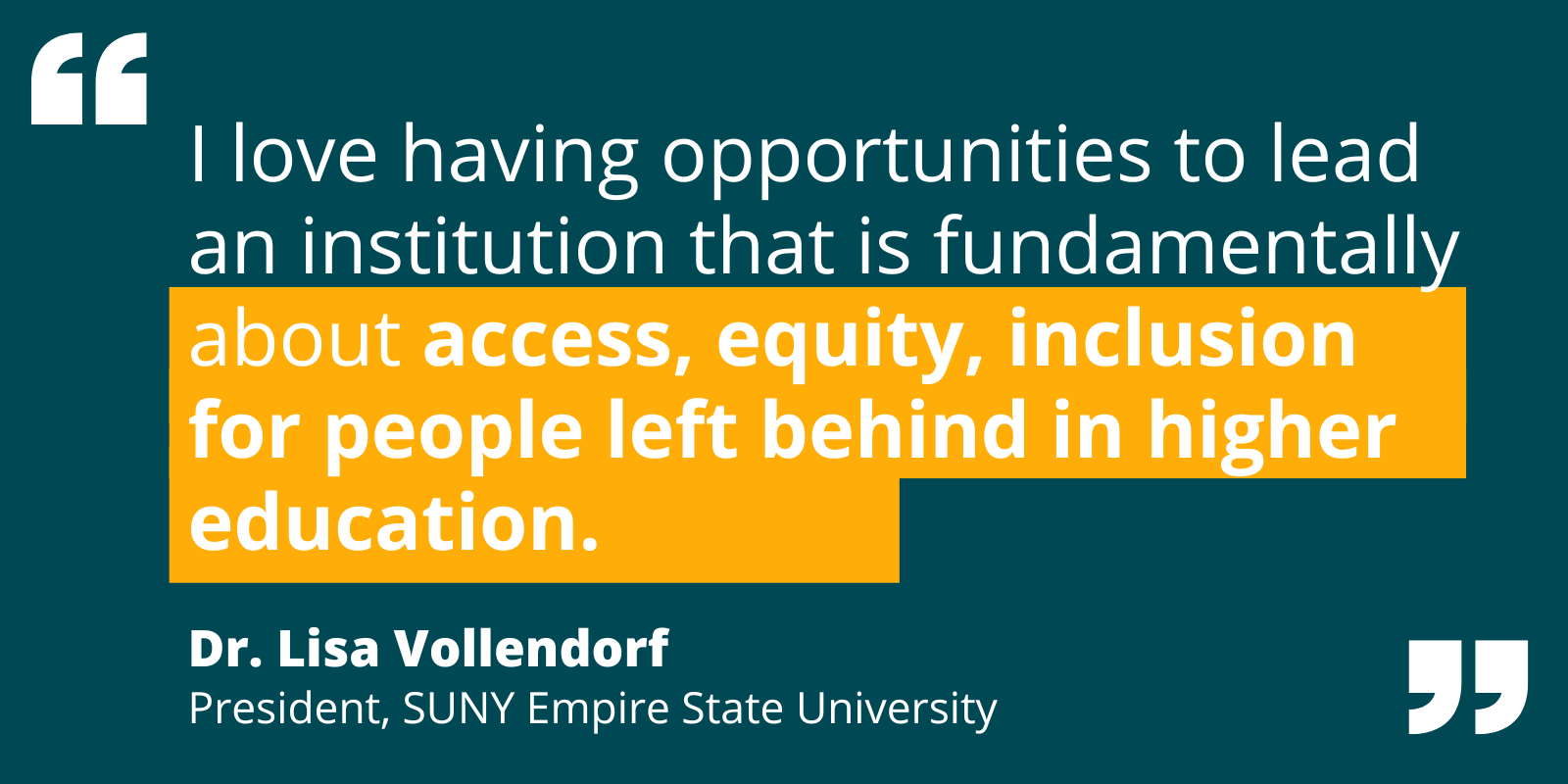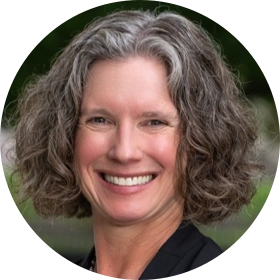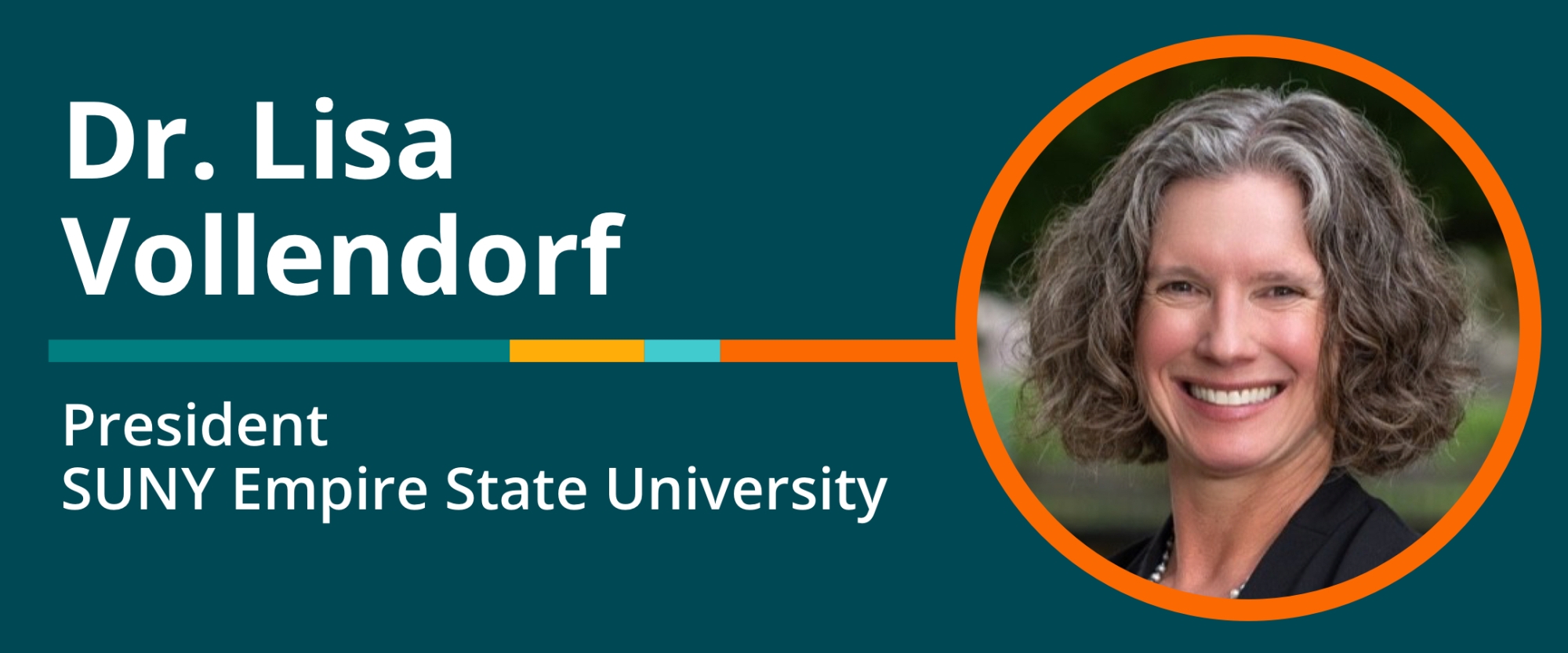At the University Innovation Alliance (UIA), we like hearing the thoughts of higher education leaders at all levels of experience. And while State University of New York (SUNY) Empire State may be Dr. Lisa Vollendorf’s first presidency, she brings more than a quarter century of perspective and experience at public institutions. She sat down with us on the Weekly Wisdom Podcast to talk about what has shaped her as a leader, reversing higher education’s tendency toward elitism, how leaders and institutions can grow through traumatic events, and the value of being present and making the best possible impact.
Leadership Focused on Access, Equity, and Impact
President Vollendorf claimed that working at public universities for over half of her lifetime has shaped and continues to shape her leadership style and philosophy:
“My framework is very much learn from those around you, and also be focused on integrating new skills, talents, and ways of being that are authentic so I can have an authentic expression of who I am. I have always looked to the core of what we deliver in public higher education, and really been mission-driven and values-aligned around access, equity, and impact, because we know – and it's horrifyingly scary for us to now have solid data on this – we know that educational status in this country is the single most important marker for longevity, or for mortality, in medical terms. And this puts a lot of pressure on us to up our game. So, I have loved having opportunities to do the good work, to have more impact over time, and to now lead an institution that is fundamentally about access, equity, inclusion, for people who are left behind in higher education.”

Fulfilling the Promise of Public Higher Ed
As a first-time president, Dr. Vollendorf’s role at SUNY Empire State has allowed her to focus on what she believes is the most significant goal for higher ed in the U.S. – access and inclusion for all, regardless of background. She defined the challenge this way:
“The biggest task facing us in higher education is to break out of our elitist framework. We do not provide access to the majority of people in this country, and we are still the most powerfully impactful higher education system in the world. We are failing ourselves by clinging to our elitism, and our elitism is expressed by keeping people out.”
She went on to explain how this has been detrimental to institutions’ ability to deliver on the promise of public higher education:
“We do not have full transferability at most institutions, so students leave behind on average 40% of their credits when they go from a community college to a four-year institution. That is unacceptable, and it is a problem that every single system has been trying to tackle for decades, and no system or conglomerate of schools has been able to solve. That, in and of itself, is a synecdoche for what is wrong with higher education in the country. We focus on ourselves as competitors at our institutions, and we focus on student success as being about how we deliver on our promise to our students, and we do not look at student success as being a holistic marker that should cross institutions and be about how we collaborate to help each student succeed.”
Learning Through Extreme Leadership Lessons
We sometimes ask our guests to share the hardest thing they’ve had to deal with in their leadership career. President Vollendorf’s answer was compelling:
“My answer has changed in the last five years. In 2017, it would have been the Sonoma-Napa firestorm that hit Wine Country and burned 6,000 homes, and 42 people died. Sonoma State University ran an emergency operations center for ten days straight. During that time, the institution was threatened. We called in brush fires that we saw coming over the mountains from Napa into Sonoma, and we still had 3,300 students living in the residence halls at that time. So that was a very stressful time for the community, and what I learned was that trauma, it's not one instance. You carry that in your community for a long time. And it changed how we operated our university, for the good, I would say.
“And then, subsequent to that, I experienced the very uncomfortable and untenable situation of having people report their harassment experiences to me, and then having to report that, appropriately so, to people above me within my system. And until all of this came to an end, those were the hardest two years so far in my life. I learned that when you choose to do the right thing for the right reason, you have to be very, very solid in your decision making. You have to know that your decision aligns with your feeling of what your integrity rests on, and you also have to wake up every single day to make that decision again, to stand by your original thought that this was the right thing. And I would say without a support network of people encouraging me to stick by what I knew was right, I don't know that I would've had the courage, resilience, or tenacity, to stay with that through the very end.
“When I came to Empire State University last summer, I said to our chief, ‘Do not worry, you will never hear me say the word crisis or emergency unless people or property are genuinely threatened.’ And he said, ‘Thank goodness, you may be the first university president to speak like that.’”
Shared Wisdom and Recommended Reading
Because the UIA is all about sharing leadership wisdom, we frequently ask our guests about notable advice they’ve received, advice they frequently give rising leaders, and books that will inspire us all. President Vollendorf willingly answered all three questions:
“I think the best advice that I've been given is to lean into where I feel I can make an impact. For me, that has meant really focusing on daily work and career opportunities where I can express the values that are dearest to me and public higher education around access, equity, inclusion, and high-quality education for all, not just for some. I have a colleague here at Empire State University who told me early on, ‘You do you,’ and I think it's advice to enact if you take it with a grain of salt. You should always try to be better in service to your north star.
“I think it's very important for people to show up as their authentic selves. So that's the other piece of advice I give people, know what your north star is. Mine is the impact that we have in public higher ed on students, their families, their communities, and the fact that if we can help one person in one family complete a college degree, statistically speaking, not only will their life be better, but their kids' lives will be better, they will have access to better healthcare, they will be more engaged citizens, they will have a pathway to intergenerational wealth, things that many people in this country take for granted, and I certainly do not.”
On the subject of books, President Vollendorf added, “I genuinely love Jeffrey Buller's Positive Academic Leadership for its aspiration and its specificity about how we need to show up in our leadership positions, regardless of title, as people always in service to those around us. My other favorite is Bob Kegan's Immunity to Change, which says every single day is relevant, not just in higher education, but for us as individuals as well as professionals.”
Note: This interview in the Weekly Wisdom Series originally aired on December 4, 2023 as part of the University Innovation Alliance’s Innovating Together Podcast, appearing live on Facebook, Twitter, and LinkedIn.
Links Mentioned in This Episode
• University Innovation Alliance
• Dr. Lisa Vollendorf
• State University of New York (SUNY) Empire State
• Weekly Wisdom Podcast
• Educational status as a marker for longevity (“The Effect of Educational Attainment on Adult Mortality in the United States” via National Institutes of Health, National Library of Medicine, 5/18/2015)
• Sonoma-Napa firestorm of 2017 (“2017 Sonoma Complex Fires” by The Sonoma County Watershed Collective)
• Sonoma State University
• Positive Academic Leadership: How to Stop Putting Out Fires and Start Making a Difference by Jeffrey L. Buller
• Immunity to Change: How to Overcome It and Unlock the Potential in Yourself and Your Organization by Robert Kegan and Lisa Laskow Lahey
Bios of Guest and Co-Hosts

Guest: Lisa Vollendorf, President, Empire State University
Dr. Lisa Vollendorf is SUNY Empire State University's sixth president. She is deeply committed to access, equity, and inclusion in public education, serving SUNY Empire’s diverse student population, and supporting the faculty and staff. Dr. Vollendorf previously served as interim provost and chief academic officer at the University of Northern Colorado. Prior to that, she worked for 16 years in the California State University system as a faculty member at three CSU campuses, department chair, academic senate chair, dean of humanities and the arts (San José State University), and provost and executive vice president (Sonoma State University) before becoming special advisor for academic continuity and operational planning at the California State University Office of the Chancellor in July 2020. She also directed the Hispanic Institute at the University of California, Santa Barbara. Prior to her work in California, she held faculty appointments at Miami University of Ohio and Wayne State University. Dr. Vollendorf’s research focuses on the cultural history of women in Iberia and Latin America during the early modern period (1500-1700). An established scholar with grants from the National Endowment for the Humanities, the Mellon Foundation, the Newberry Library, the Huntington Library, and the William Andrews Clark Memorial Library, she has published two monographs, six edited books, and 35 chapters and articles. She earned her B.A. in English and Spanish at Colorado State University. After studying abroad in Costa Rica, she pursued a Ph.D. in Romance Languages at the University of Pennsylvania. Dr. Vollendorf grew up in Summit County, Colorado, where she developed a deep love and respect for the planet. She is an avid hiker, backpacker, and traveler.

Co-Host: Bridget Burns, Executive Director, University Innovation Alliance
Dr. Bridget Burns is the founding Executive Director of the University Innovation Alliance (UIA). For the past decade, she has advised university presidents, system chancellors, and state and federal policy leaders on strategies to expand access to higher education, address costs, and promote completion for students of all backgrounds. The UIA was developed during Bridget’s tenure as an American Council on Education (ACE) Fellowship at Arizona State University. She held multiple roles within the Oregon University System, including serving as Chief of Staff and Senior Policy Advisor, where she won the national award for innovation in higher education government relations. She was a National Associate for the National Center for Public Policy and Higher Education, and has served on several statewide governing boards including ones governing higher education institutions, financial aid policy, and policy areas impacting children and families.

Co-Host: Doug Lederman, Editor and Co-Founder, Inside Higher Ed
Doug Lederman is editor and co-founder of Inside Higher Ed. With Scott Jaschik, he leads the site's editorial operations, overseeing news content, opinion pieces, career advice, blogs and other features. Doug speaks widely about higher education, including on C-Span and National Public Radio and at meetings and on campuses around the country. His work has appeared in The New York Times and USA Today, among other publications. Doug was managing editor of The Chronicle of Higher Education from 1999 to 2003, after working at The Chronicle since 1986 in a variety of roles. He has won three National Awards for Education Reporting from the Education Writers Association, including one for a 2009 series of Inside Higher Ed articles on college rankings. He began his career as a news clerk at The New York Times. He grew up in Shaker Heights, Ohio, and graduated in 1984 from Princeton University. Doug and his wife, Kate Scharff, live in Bethesda, MD.
About Weekly Wisdom
Weekly Wisdom is an event series that happens live on Facebook, Twitter, and LinkedIn. It also becomes a podcast episode. Every week, we join forces with Inside Higher Ed and talk with a sitting college president or chancellor about how they're specifically navigating the challenges of this moment. These conversations will be filled with practicable things you can do right now by unpacking how and why college leaders are making decisions within higher education. Hopefully, these episodes will also leave you with a sense of optimism and a bit of inspiration.
Rate, Review & Subscribe
Learn why hundreds of people have rated this new podcast 5 stars! Please join others and rate and review this podcast. This helps us reach and inform more people -- like you -- to help increase the number and diversity of college graduates in the United States.
Click here, scroll to the bottom, tap to rate with five stars, and select “Write a Review.” Then be sure to let us know what you loved most about the episode! Also, if you haven’t done so already, subscribe to the podcast. We’ll be adding a bunch of bonus episodes to the feed and, if you’re not subscribed, there’s a good chance you’ll miss out.

